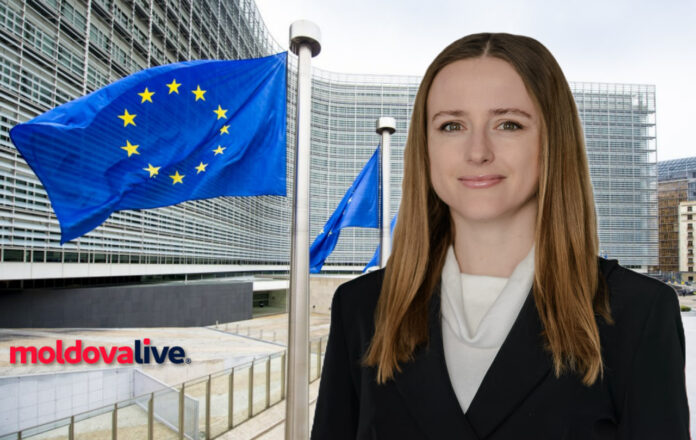Carolina Novac, the State Secretary of the Ministry of Energy, participated in the bilateral screening session on “Free Movement of Goods” held in Brussels from February 18-21, 2025. This meeting marked another outstanding step in Moldova’s journey toward European integration, focusing on the country’s progress in the economic and energy sectors, as well as in the business environment.
During the session, Carolina Novac presented Moldova’s current energy profile, emphasizing the priorities for implementing the EU Ecodesign Directive and the development of net-zero production in the country, which aims to minimize greenhouse gas emissions.
“By stimulating net-zero production industries, Moldova can position itself as a competitive hub for the sustainable industry, prioritizing both internal and external investments in renewable energy technologies, green supply chains, and innovative climate solutions,” said Carolina Novac during her presentation.
The discussions also covered the implementation of the European Parliament and Council Regulation, which establishes a framework for reinforcing net-zero emission manufacturing technologies within the EU.
FOR THE MOST IMPORTANT NEWS, FOLLOW US ON TWITTER!
Thus, Moldova aims to introduce a specific legal framework for this regulation by 2030. Additionally, the country targets increasing the use of renewable energy and energy storage solutions in batteries, implementing state aid schemes for investments in the industrial sector focusing on net-zero technologies, and developing research and development capacities by 2030.
During her visit to Brussels, State Secretary Carolina Novac also met with Mechthild Wörsdörfer, Deputy Director-General of the Directorate-General for Energy at the European Commission (DG ENER).
The parties reviewed the energy sector reform agenda, priorities for the Moldova Growth Plan, the achievement of long-term goals outlined in the National Integrated Energy and Climate Plan, and the acceleration of energy efficiency project implementation. The European official reiterated DG ENER’s support for the steps taken by the Government of Moldova and the Ministry of Energy to ensure the country’s energy resilience and align it with the EU’s energy acquis.
In Brussels, Carolina Novac also met with representatives from European associations in energy storage, batteries, green mobility, and waste-to-energy transformation (Energy Storage Coalition, EARPA, Flow Batteries Europe, EsWet, BEDA).
Discussions focused on the possibility of adopting best practices and experiences from associations in EU member states operating in areas of the most extensive interest to Moldova’s business environment, particularly support schemes for prosumers.
With Giles Dickson, CEO of WindEurope, discussions focused on progress regarding the launch of tenders for impressive wind and photovoltaic park construction and the accountability of grid connection permit holders through the introduction of financial guarantee mechanisms for building power plants with a capacity greater than 200 kW.
After she visited Brussels, Carolina Novac addressed the screening session, providing a statement on the contributions and the level of implementation of regulatory measures for products with specific energy efficiency labels. In this context, the State Secretary emphasized that the National Center for Sustainable Energy continuously works to raise awareness so that consumers know how to read and identify eco-design specifications of a product and choose energy-efficient products correctly.
Carolina Novac stated that efforts are ongoing in eco-design to ensure full compliance with the EU Ecodesign Directive requirements for energy-related products. She emphasized that Moldova is fully aligned to implement EU recommendations and raise awareness among citizens about high energy efficiency products.
The EU Ecodesign Directive stimulates the market by banning the least efficient products. The energy labeling directive encourages consumers to purchase more energy-efficient products by informing them about their energy consumption through a label.
Last year, the Government of Moldova approved regulations on energy labeling for refrigerators, washing machines, dishwashers, light bulbs, and electronic displays based on the new law on energy-related product labeling passed in October, which transposes the new labels adopted by the European Union with a new classification of energy efficiency for household appliances.
These regulations will contribute to achieving the goal of decarbonizing Moldova’s economy by 2050.


